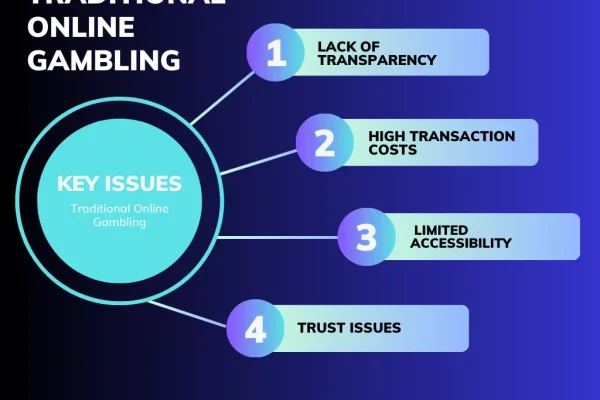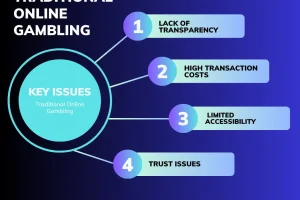Let’s be honest for a second. The world of online gambling, for all its flash and excitement, has a bit of a trust problem. You click “spin” or place a bet, and you’re essentially taking the platform’s word for it. Was that slot result truly random? Is my money actually safe? It’s a bit like handing your wallet to a magician and hoping you get it all back.
Well, what if there was a way to rip open the black box? To see the gears turning, to verify every single transaction and game outcome yourself? That’s the promise—the really compelling promise—of blockchain technology. It’s not just about cryptocurrency; it’s about building a foundation of radical transparency that could, quite frankly, change the game forever.
The Core Problem: Trust in a System Built on Secrecy
Traditional online casinos operate on a centralized model. They control the servers, the software, the financial ledger—everything. This creates a few major pain points for players:
- Opaque Game Integrity: How can you be 100% sure that the digital deck wasn’t stacked against you? You can’t. You just have to trust that the Random Number Generator (RNG) is truly random and hasn’t been tampered with.
- Slow and Opaque Payouts: Withdrawals can take days, sometimes weeks. The process is often a mystery, with hidden fees lurking in the fine print.
- Data Vulnerability: Centralized databases are honeypots for hackers. Your personal and financial information is only as safe as the platform’s security, which has proven to be a gamble in itself.
It’s a system that, by its very design, asks for a lot of faith. And frankly, many players are running out of it.
How Blockchain Cracks the Code on Transparency
Okay, so here’s the deal with blockchain. Imagine a giant, digital ledger. But instead of it being locked in one company’s vault, it’s distributed across thousands of computers worldwide. Every transaction—every bet, every win, every deposit—is recorded as a “block” and added to a “chain” of previous transactions.
The magic is in its design. Once something is written on that chain, it can’t be altered or deleted. It’s permanent, time-stamped, and visible to anyone. Trying to change a record would be like trying to remove a single ingredient from a baked cake—it’s just not possible without everyone noticing.
Provably Fair Gaming: Your Built-in Lie Detector
This is where it gets really cool for gamblers. Blockchain enables something called “provably fair gaming.” It’s a system that lets you, the player, verify the fairness of each game round after it’s over.
Here’s a simplified version of how it works:
- Before you spin a slot or are dealt a card, the platform generates a secret seed and a public hash (a kind of digital fingerprint).
- You provide your own seed, which gets mixed in.
- The game outcome is determined by the combination of these seeds.
- After the game, the casino reveals its secret seed.
- You can now take both seeds, run them through a verification algorithm, and confirm that the result was predetermined and fair—no funny business.
It’s like being able to rewind a live sports play with instant replay from every angle. The house can’t cheat because the evidence is right there, etched in digital stone for anyone to check.
Smart Contracts: The Unbiased, Automated Payout Machine
Then we have smart contracts. These are self-executing contracts with the terms of the agreement written directly into code. Think of them as a robotic escrow agent that never sleeps, never gets biased, and never makes a mistake.
For transparent gambling transactions, this is a game-changer. Let’s say you win a bet. A smart contract can automatically release the winnings to your digital wallet the moment the outcome is verified on the blockchain. No waiting for manual approval. No processing delays. The code is the law, and it executes instantly.
| Traditional System | Blockchain System |
| Payouts processed manually (1-5 days) | Instant, automated payouts via smart contracts |
| Game fairness based on third-party audits (you hope) | Provably fair, verifiable by the player in real-time |
| Centralized control of funds and data | You hold your funds in your own wallet (self-custody) |
| Transaction fees can be hidden or high | Lower, more transparent network fees |
The Real-World Hurdles: It’s Not All Smooth Sailing
Now, for a dose of reality. As revolutionary as this sounds, blockchain gambling isn’t perfect yet. The user experience can be clunky. You have to manage crypto wallets, remember private keys, and navigate the volatility of cryptocurrency prices. It’s a steeper learning curve than just using a credit card.
Regulation is also a massive grey area. Governments and licensing bodies are still scrambling to figure out how to handle decentralized, anonymous, and borderless platforms. This creates uncertainty for both operators and players.
And, you know, there’s the energy consumption question with some blockchains, though many newer, more efficient networks are solving that problem.
A Glimpse into the Future: What Transparent Gambling Really Means
Despite the challenges, the direction is clear. The demand for secure and transparent online betting is only growing. We’re likely to see a hybrid future where traditional casinos adopt blockchain elements to prove their fairness, while fully decentralized platforms continue to innovate.
Imagine a world where your entire gambling history is an immutable, private record on a blockchain. You could easily switch between platforms, taking your verified player reputation with you. Loyalty programs could become more meaningful and transparent. The very concept of “the house edge” could be explicitly coded for all to see, removing any doubt.
It shifts the power dynamic. It moves the industry from a place where you have to trust, to a system where you can simply verify.
So, the next time you think about placing a bet online, consider what you’re really wagering on. Are you just betting on a game? Or are you also betting on the integrity of the platform itself? Blockchain technology offers a path where that second bet—the bet on trust—is one you don’t have to make anymore. The ledger, in all its unchangeable, distributed glory, does the talking for you.












